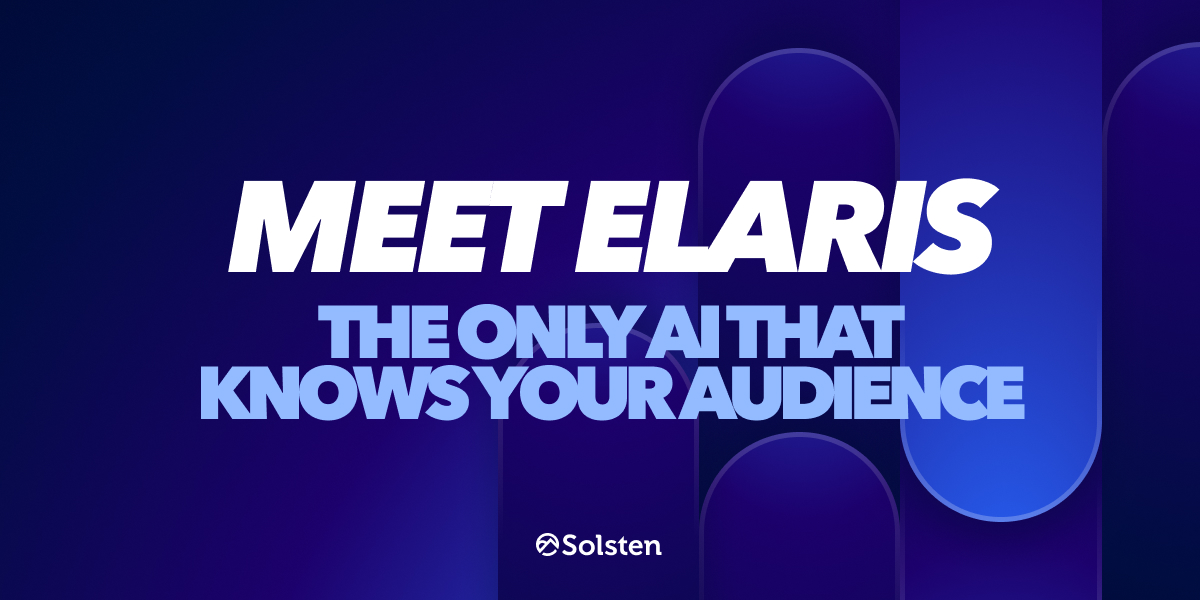You ask ChatGPT: “What motivates fitness app users?”
ChatGPT responds: “Fitness app users are motivated by a combination of personal goals, social influences, and technological features that make exercise more accessible and engaging….”
You ask Elaris the same question.
Elaris responds: “Fitness enthusiasts break into 5 distinct psychological segments: The Passionate Trendsetter (27.5%) who responds to high-energy, social marketing, The Confident Socializer (20.8%) who favors influencer-driven FOMO campaigns, The Visionary Achiever (18.3%) who prefers premium, purpose-driven messaging…”
One gives you generic advice. The other gives you insights from 500,000 real fitness enthusiasts’ psychological profiles.
That’s the difference between AI trained on web content and AI trained on human psychology.
This is Elaris, and it’s changing how smart marketers understand their audiences.
Why ChatGPT Can’t Tell You What Your Customers Actually Want
Most AI tools are built on web content, not human insights. When you ask ChatGPT about customer motivation, you’re getting a sophisticated summary of what marketing blogs and research reports have already said. The responses sound authoritative, but don’t have the psychological depth that drives real purchasing decisions.
This is a massive limitation. Here’s why:
ChatGPT processes millions of web pages containing marketing advice, case studies, and demographic generalizations. When you ask about electric vehicle buyers, for example, you’ll get the same surface-level categories everyone else has read: “environmental concerns, economic considerations, and technological expectations.” These responses feel comprehensive because they cover multiple factors, but they treat all electric vehicle buyers like they have the same intrinsic motivations.
This isn’t connected to reality. Two people can both care about “environmental concerns” while being driven by completely different psychological needs. One person might prioritize environmental impact because it signals their values to their social circle, while another focuses on environmental benefits because they provide long-term cost savings.
The first person responds to aspirational messaging about making a difference, and the second wants detailed efficiency data and total cost of ownership calculations. ChatGPT can’t distinguish between these fundamental motivational differences because it wasn’t trained to understand human psychology.
This missing context becomes expensive. Marketing teams spend months developing campaigns around these generic insights, only to discover their messaging doesn’t resonate. A $50,000 market research study might confirm that “millennials value authenticity,” but it won’t explain why some millennials respond to aspirational luxury messaging while others prefer understated quality signals.
Your competitors get the same advice from the same AI tools. When everyone optimizes for “environmental concerns” and “technological expectations,” the market becomes saturated with identical messaging. The brands that break through are speaking to psychological drivers that ChatGPT can’t identify.
Ask any AI about “electric vehicle buyers” and you’ll encounter this limitation firsthand. The response lists obvious motivations without revealing the psychological nuances that determine which marketing approaches actually work.
Elaris, on the other hand, identifies four distinct psychological segments: Status Seekers (50%), Practical Skeptics (22.5%), Tech Enthusiasts (7.5%), and Conscience Buyers (20%). Each segment requires different marketing approaches, creative strategies, and messaging frameworks.
The First AI Built on Human Psychology, Not Web Pages
Elaris represents a completely different approach to marketing intelligence. While other AI tools guess about human behavior based on internet content, Elaris knows human behavior based on psychological science. Built on Solsten’s psychological database representing 3.4 billion people worldwide, it provides conversational access to 100,000+ unique audiences with rich psychological profiles. These audiences range from brands to interests to media properties, and everything in between. They can be as broad as “running,” or as niche as the 2019 film Running With the Devil.
This matters for practical reasons. When you ask Elaris about your audience, you’re accessing psychological profiles from actual people who have completed validated assessments measuring their values, motivations, and communication preferences. ChatGPT gives you demographic generalizations or behavioral assumptions. Elaris gives you the scientific measurements of psychological traits that predict purchasing behavior, content preferences, and brand loyalty.
What is Elaris?
Elaris is a psychology-driven marketing assistant that helps you create and optimize high-impact content by deeply understanding your audience’s core motivations. The conversational interface makes complex psychological data immediately accessible, transforming insights that used to require research teams and months of analysis into instant content and strategy.
The scientific methodology behind Elaris sets it apart from content-trained AI. Rather than synthesizing existing marketing wisdom, it draws from adaptive psychological assessments that measure over 250 validated traits. These assessments meet clinical psychology standards for reliability, providing measurement precision that traditional market research can’t match.
What makes this practically useful are Elaris’s core capabilities:
Deep Audience Profiling: Build rich personas based on values, motivations, and communication preferences, going beyond demographic categories to reveal psychological drivers.
Content Strategy & Creation: Generate ready-to-go social assets, ad copy, messaging frameworks, marketing briefs, and countless other content types, all tailored to your audience’s specific psychological traits.
Instant Performance Scoring: Evaluate ads, posts, and campaigns against psychological engagement factors, providing actionable recommendations that improve resonance.
Competitive Benchmarking: Compare your brand’s approach to top competitors and uncover messaging gaps and positioning opportunities that demographic analysis misses.
Strategic Planning: Map out campaign roadmaps aligned with your audience’s core psychological drivers, ensuring every touchpoint speaks to motivations that actually influence decisions.
Here’s what actual users are saying about Elaris:
Elaris shines a blatant spotlight on OpenAI’s primitive beginnings.
Elaris is the first AI tool that actually feels like a creative partner. It helps me get clear on who I’m writing for, gives me ideas that are actually useful, and makes it easier to back up my choices with solid insights.
This is the fastest and easiest route to communicating effectively with your customers.
Being able to confidently apply the lens of relevant brands gives me a clearer voice as compared to other AI tools. It is enough to stand out in a market flooded with AI generated communication.
See the Difference: Same Question, Completely Different Insights
To illustrate this difference, we asked ChatGPT and Elaris the same question:
“What motivates natural skincare shoppers?”
Both gave detailed responses:
ChatGPT Response:
Natural skincare buyers are driven by a combination of health, environmental, and ethical considerations, influenced by personal experiences and broader cultural trends.
Elaris Response:
This audience is driven by a blend of ambition, security, and personal growth, with a strong emphasis on tangible rewards and respect. Their motivation is practical, goal-oriented, and rooted in a desire for both personal advancement and stability.
Analysis of the Difference
ChatGPT’s Approach: The response provides generic categories that sound comprehensive but lack specificity. Terms like “health considerations” and “environmental values” represent broad buckets that could apply to dozens of product categories. The insight treats all natural skincare buyers as a homogeneous group, missing the psychological nuances that determine which marketing approaches actually convert.
Elaris’s Approach: The response reveals precise psychological drivers with measurable specificity. Instead of listing obvious categories, Elaris identifies the psychological tension between ambition and security that characterizes this audience. The insight explains both what they want, and why they want it, providing the psychological foundation for strategic differentiation.
Actionability Comparison
What ChatGPT tells you to do:
- “Emphasize transparency, sustainability, and authenticity”
- “Provide clear information about ingredient sourcing”
- “Consider peer recommendations and reviews”
The problem: Every natural skincare brand already follows this playbook. The advice offers no competitive differentiation and doesn’t explain how to execute these strategies effectively.
What Elaris tells you to do:
- Target achievement-oriented messaging that positions skincare as professional advancement
- Emphasize financial value and long-term ROI rather than trendy ingredients
- Create reward and recognition programs that acknowledge expertise
- Focus on proven results over experimental approaches
- Avoid community-impact messaging, which ranks low as a motivator for this audience
The advantage: These recommendations create clear differentiation opportunities. While competitors focus on sustainability messaging, you can capture the achievement-oriented segment with professional advancement positioning.
Psychological Depth Comparison
ChatGPT’s limitations: The response assumes motivations based on product category rather than measuring actual psychological drivers. It focuses on external factors like social media influence and price sensitivity while treating psychology as secondary to demographics.
Elaris’s insights: The response reveals core personality traits and motivational hierarchies specific to natural skincare buyers. It identifies the psychological tension between ambition and security. This is an unusual combination that explains why traditional wellness marketing often misses this audience. The insight provides psychological reasoning for purchase behavior rather than demographic assumptions.
Key psychological discoveries Elaris reveals:
- Ambition + Security Paradox: High achievers who prioritize stability (uncommon trait combination)
- Respect as Primary Driver: Need for professional acknowledgment influences purchase decisions
- Low Openness to Experimentation: Preference for proven solutions over trendy ingredients
- Practical Goal Orientation: Skincare decisions tied to professional and personal advancement goals
Strategic Implications
ChatGPT’s tactical suggestions:
❌ Generic: “Emphasize sustainability” (everyone does this)
❌ Obvious: “Use social media influencers” (saturated approach)
❌ Competitive: “Be transparent about ingredients” (table stakes)
❌ Broad: “Appeal to wellness lifestyle” (vague execution)
Elaris’s strategic opportunities:
✅ Differentiated: “Position as professional advancement tool”
✅ Psychologically-informed: “Emphasize ROI over experimentation”
✅ Specific: “Create achievement recognition programs”
✅ Strategic: “Avoid community impact messaging” (counterintuitive but data-driven)
The comparison shows why psychological insights create competitive advantages that demographic targeting cannot match. While ChatGPT provides advice that sounds reasonable but lacks differentiation, Elaris reveals the psychological drivers that explain why certain approaches succeed while others fail to resonate.
From Gaming to Healthcare, Elaris Works Everywhere
Elaris’s psychological foundation makes it effective across industries where traditional AI tools struggle with context.
In content marketing, you can discover what psychological traits drive engagement in your specific niche, moving beyond generic content advice to understand why certain topics perform better for your audience. Elaris generates content themes and messaging frameworks tailored to audience psychology, helping you create content calendars that align with psychological preferences rather than trending topics.
Product development teams use Elaris to identify psychological needs their products should address. Instead of guessing which features will resonate, you can understand feature preferences across different user personality types and predict which product directions will align with core audience motivations. This psychological approach to product strategy helps design user experiences that feel intuitive because they match how your audience naturally thinks and makes decisions.
Advertising and creative teams discover the difference between demographic targeting and psychological targeting. Elaris generates ad copy and creative concepts that speak to core motivations, helping you move beyond surface-level audience categories. The platform scores existing campaigns against psychological engagement factors, revealing why some ads perform well while others with similar demographics and budgets fall flat.
Customer research and strategy applications replace expensive focus groups with instant psychological insights. You can understand customer churn from a psychological perspective, identifying which personality traits correlate with retention and which predict abandonment. This understanding helps identify expansion opportunities based on audience psychology and build comprehensive customer personas with psychological depth that actually predicts behavior.
Competitive intelligence through Elaris analyzes competitors’ audiences psychologically, revealing positioning opportunities that traditional competitive analysis misses. You can identify underserved psychological segments in your market and understand market positioning from a psychological angle, uncovering messaging gaps that create competitive advantages.
Industry Applications
Gaming: Player motivation analysis and engagement optimization, understanding why different player types engage with different game mechanics.
E-commerce: Consumer psychology and purchase decision drivers, discovering the psychological factors that predict conversion and lifetime value.
SaaS: User psychology, retention strategies, and feature prioritization based on psychological needs rather than feature requests.
Healthcare: Patient motivation and treatment compliance psychology, understanding what psychological factors influence health behavior changes.
Finance: Investor psychology and financial decision-making patterns that inform product development and customer communication.
Education: Learning motivation and student engagement psychology to improve educational outcomes and platform design.
Simple Questions, Sophisticated Answers
Elaris works through natural conversation. You ask questions and get detailed psychological insights. Unlike generic AI, you’re accessing psychological intelligence from millions of real people across 100,000+ unique audiences.
Types of Questions You Can Ask:
- Audience Analysis: “What psychological traits define [specific audience]?”
- Competitive Intelligence: “What would make this audience choose [Brand A] over [Brand B]?”
- Content Strategy: “What content themes resonate with [audience segment] and why?”
- Product Development: “What psychological needs should [product type] address?”
- Campaign Optimization: “Score this ad copy for psychological alignment with [audience]”
- Marketing Strategy: “How should I position [product] to appeal to [audience’s] core motivations?”
What You Get
Elaris delivers comprehensive insights that transform your marketing approach. You’ll receive detailed psychological profiles that reveal specific traits, motivations, and values driving your audience’s decisions. Instead of relying on guesswork, you’ll get data-backed marketing recommendations precisely tailored to your audience’s psychology.
The platform generates content and creative suggestions designed to resonate with your audience’s core psychological drivers, while providing performance scoring and optimization recommendations to continuously improve your campaigns.
You’ll gain competitive insights and discover market positioning opportunities that others miss, along with ready-to-implement campaign strategies and messaging frameworks that speak directly to what motivates your audience.
The Science Behind the Answers
Elaris stands apart through its sophisticated methodological foundation. Our platform deploys adaptive psychological assessments that measure over 250 scientifically validated personality traits and cognitive patterns, providing unprecedented depth in audience understanding.
This assessment capability is continuously enhanced through ongoing data collection from engaged users spanning every major industry, ensuring our insights remain current and comprehensive.
Advanced machine learning algorithms work behind the scenes to identify complex psychological patterns and preferences that would be impossible to detect through traditional research methods.
Importantly, all insights are cross-validated against established clinical psychology standards for reliability, ensuring that the recommendations you receive meet the same rigorous criteria used in professional psychological practice.
Your First Elaris Conversation in 5 Minutes
Step 1: Sign Up (30 seconds)
- Create a free account at elaris.new
- Gain access to the conversation interface
- Start creating resonant content immediately
Step 2: Ask Your First Question (1 minute)
Proven Starter Questions:
- “What psychological traits define customers in [your industry]?”
- “How do [competitor’s] customers differ from typical [industry] users?”
- “What motivates people who buy [your product category]?”
- “What content themes resonate with [your target audience]?”
Step 3: Explore the Insights (3 minutes)
- Read the psychological breakdown and specific trait scores
- Note key motivations, values, and communication preferences
- Ask follow-up questions for deeper insights into specific segments
- Request specific marketing recommendations based on the psychology
Step 4: Apply to Your Marketing (1 minute)
- Use psychological insights to refine messaging and positioning, or have Elaris do it for you
- Adjust targeting strategies based on motivational drivers
- Plan content themes around psychological preferences
- Score existing campaigns against psychological engagement factors (Elaris can do this for you too)
Pro Tips for Better Questions:
- Be specific about your audience, industry, or competitive context
- Ask about motivations and values, not just behaviors or demographics
- Follow up with “how should I market to them?” for tactical recommendations
- Explore different psychological segments within your broader audience
- Request performance scoring for existing campaigns or content
Start Understanding Your Audience Today
Your audience possesses psychological complexity that ChatGPT can’t capture. While your competitors make decisions based on age groups and geographic regions, you can understand the motivational drivers that actually influence purchasing behavior.
Elaris provides immediate access to psychological insights that transform marketing effectiveness. The platform removes the guesswork from audience understanding, replacing expensive research cycles with instant strategic guidance.
The difference between knowing your audience’s demographics and understanding their psychology determines whether your marketing creates genuine connection or gets ignored in an increasingly crowded marketplace. Thousands of marketers have already discovered what drives their audiences at a psychological level. Your understanding doesn’t have to remain surface-level when psychological depth is just a conversation away.






